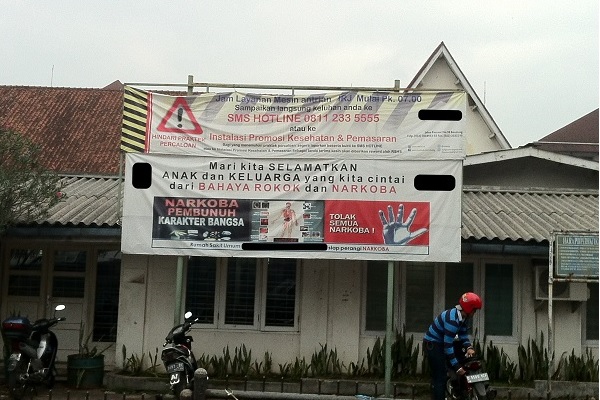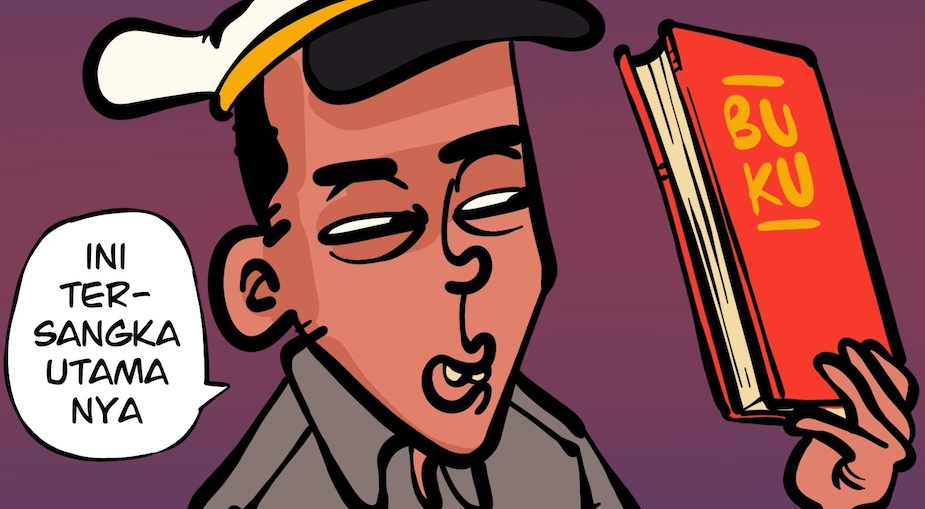People who use drugs occupy an ambiguous position in Indonesian government rhetoric
Lex Kuiper
It was 26 June 2014, and the garden outside a Javanese governor’s office was colourfully decorated with red and white material. Children danced to the rhythm of a gamelan orchestra in front of a large crowd of representatives from the provincial government, the police, the army, the National Narcotics Agency (BNN), hospitals, local health clinics and NGOs. The celebration commemorated the International Day against Drug Abuse and Illicit Trafficking. On that day, BNN, the government agency tasked with reducing illegal production, trafficking and use of drugs, took stock of the preceding year’s achievements and next year’s plans. In their speeches, government officials praised BNN and the police and officials for their efforts in drug control.
Less cheerful was the message of the BNN officer who opened the event. Standing in front of large posters that stated ‘Indonesia drug free 2015’, ‘Protect the future of our people by fighting drugs’ and ‘Come on, let’s save our brothers and sisters’, she emphasised the danger that drugs posed to Indonesian society. She started by saying, ‘Our nation faces an extraordinary crime’, and then continued to warn the audience that ‘drug use knows no boundaries, that is to say, [people of] all ages, all professions, all religions and all education levels can become drug users’. These ominous warnings of the growing number of people who use drugs threatening to frustrate BNN’s target of achieving a nation ‘free of drugs’ echoed throughout the day.
Alongside this message, however, another framing of the ‘drug problem’ came to the fore. Somewhat out of place amidst the drug control discourse, it promoted the imperative to save people who use drugs through treatment.
From ‘protecting the people’
Indonesia’s zero-tolerance stance on drug offending gained international attention when President Joko Widodo ordered the execution of 18 drug convicts in 2015 and 2016. Government rhetoric often paints a picture of drugs as an external threat that is weakening Indonesia internally. The existential threat that drug consumption purportedly poses to society and the state has historically served as a justification for enacting strict narcotic laws. In 1976, Suharto’s New Order regime significantly increased sanctions on drug use and trafficking, citing that ‘it is not impossible that drug abuse is one means among many for subversive activities’. The regime was perhaps triggered by the increasing availability of marijuana and heroin, but also by a conviction that harsh policies were needed as it sought to suppress its enemies. The New Order regime viewed people who used drugs with suspicion and hostility, envisaging them as hindering the stability and development of Indonesia.

Subsequent laws have increased the number of offences that demand prison sentences, created more complex differentiations between drugs, instituted mandatory minimum sentencing and increased jail time. Despite more attention on human rights and democratisation in the post-Suharto era, the current law still claims that drug use is a threat to humanity’s survival and maintains heavy penalties for traffickers and users alike.
On the International Day against Drug Abuse and Illicit Trafficking, then vice president Boediono went on the public record claiming in a televised speech that drug use could lead to societal disruption. He said ‘We are dealing with an illegal commodity that can damage individuals and in the end destroys the community bit by bit and eventually the state. [International networks of narcotic dealers] wish to feed again and again on a weak people’.
To ‘saving people who use drugs’
At the same time, the Indonesian government was calling on society to save people who use drugs. BNN declared 2014 ‘the year of saving drug users’, and on national television its then chief Anang Iskandar reiterated the refrain that ‘drug use can be prevented and rehabilitated’. He hoped that ‘society will not have an inaccurate view of narcotic [users]. People who are sick need our help to stop. They need rehabilitation so they can function as normal people in society’. His thinking then was that drug users needed to be saved and helped so that they could not only have a better future, but also make positive contributions to the nation.

The right to healthcare for people with drug dependence was already present back in 1976 in the country’s first law seeking to regulate the use, possession, trafficking and production of illicit substances. This right was again emphasised in the 2009 Anti-Narcotics Law. In addition, Supreme Court judges have noted that ‘a large number of the criminals and convicts on drug charges are part of a drug user or even victim category, those who – if seen from a medical viewpoint – are in fact people that are suffering from a disease’. Later, in 2014, the Supreme Court, the Attorney General’s Office, BNN and several ministries committed to reducing the number of ‘drug addicts and victims of drug abuse’ by channelling more people into treatment rather than prison. People who use drugs, based on the new rhetoric, were in need of saving.
The rub: compulsory reporting
People who use drugs, however, hold an ambiguous position as both criminal and as patient. As one BNN officer told me ‘if you have injured your leg you will seek treatment so you can walk again. With drugs, you don’t realise you are sick, that is why you need to report’. To dispel this ambiguity and to further treatment and rehabilitation, compulsory (self-) reporting was introduced for people with drug dependence in 2011. An official aim of this requirement was to ‘fulfil the rights of drug users in obtaining treatment and/or care through medical and social rehabilitation’. In theory, they ought to have access to free rehabilitation and treatment, and protection from arrest and imprisonment.
In practice, compulsory reporting has offered little protection. Even after self-reporting, most people arrested for drug use are still imprisoned or sent to forced rehabilitation. In addition, there is little regulation of how sensitive registration data should be stored or used. This has raised safety and privacy concerns among civil society groups over potential abuse, especially since individuals’ identities are shared with BNN. Understandably, people who use drugs are hesitant to report their still-criminalised activities. In the end, people who use drugs figure in government rhetoric and policy as both criminals and victims in need of saving, which ultimately prevents them from receiving the protection and care they need.
Lex Kuiper (L.L.Kuiper@uva.nl) is a PhD candidate at the Amsterdam Institute for Social Science Research.















